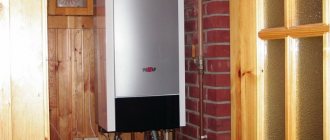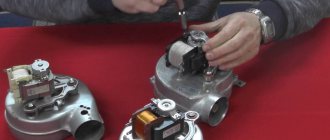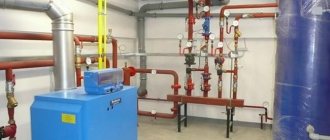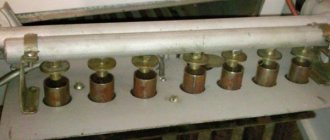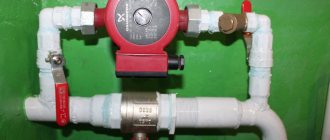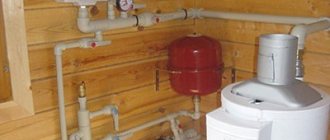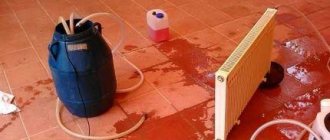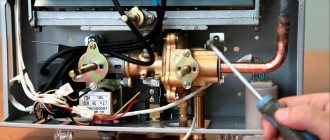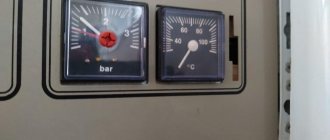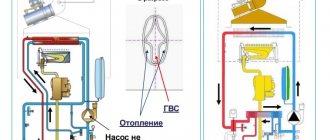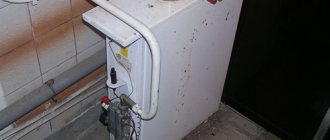The operation of a new, correctly installed heating boiler, as a rule, has a silent mode. This aspect is one of the quality indicators of heating device manufacturers. But sometimes even when a new boiler is operating, unpleasant noise occurs. This may take some time until all parts of the boiler fall into place under the influence of temperature changes.
After prolonged use and quite often, the boiler begins to make noise and hum, making uncomfortable sounds. This problem can have several causes and should only be addressed by a specialist. It is important to take preventive and repair actions in a timely manner in accordance with safety regulations.
Main causes of noise and humming
Let's name the most common causes of noise and humming of the boiler:
- oversaturation of water in the heating system with oxygen;
- sediment on parts from water circulation (including in the heat exchanger);
- fan malfunction;
- reduction in gas pressure.
Oversaturation of water with oxygen in the heating system
The noise or hum of the device may be monotonous or spontaneous with a crackling sound. With the first option, this happens even with new boilers. In this case, such sounds are usually produced by installations that are connected to a heating system with natural circulation. The reason may be oversaturation of oxygen in the water in the pipes. Then, when the water heats up, small bubbles form, making noise. The noise does not pose a danger to the operation of the boiler. But a small nuisance is still present, as it creates discomfort with noise in the pipes of the rooms. In this case, the system can be converted to a closed one. The process of changing the type of system consists of installing valves on the boiler and changing the expansion tank to a membrane one. You can choose an automatic system that is sensitive to weather conditions. These measures will help extend the life of the boiler.
Sediment on parts from water circulation
But there are other reasons why the boiler is humming. The wine may be in the sediment that forms as a result of water circulation. It is not pre-filtered; when heated, after some time it forms scale on the parts. Their functions weaken, and extraneous noise appears from the work process. The heat exchanger is the first to lose its ability. It heats up as a result of gas combustion, transferring heat. Scale forms not only on the walls of pipes and radiators, but also on the entire system. The passage for water narrows, which provokes the appearance of steam. Such processes reduce the wear resistance of equipment and efficiency. Tapping appears. This means that the system needs to be descaled. Cleaning is done with special chemicals. After this the boiler stops humming
Fan malfunction
Another common reason for a noisy boiler could be a fan malfunction. It is responsible for cooling the system, removing combustion products outside the room, and removing smoke. A boiler technician will determine the cause of the fan problem. This may be the location above the main heating pad or lack of lubrication. Often the spare part is simply clogged with dust. They inspect, clean this part, and lubricate the bearings. If necessary, it is worth changing the fan so as not to buy a new boiler.
Reduced gas pressure
Sometimes the boiler makes noise and hums due to a decrease in pressure. As a result, less water begins to circulate in the system, air jams occur, the boiler overheats and makes noise. The level of thermal output of the device and its sections decreases. Just adjust the pressure. Most boilers have a lever installed for such cases. You should know the optimal indicators and regularly check the condition of the boiler. Normal pressure is 1.5-2 atmospheres. Often a knocking sound is heard from the pipeline and radiators, which means air has entered the system and needs to be removed. If the pump itself is noisy, then a manufacturing defect cannot be ruled out.
Methods for cleaning radiators from dirt
During operation of the heating system, dirt accumulates in it: iron oxides, dissolved salts and possible mechanical impurities. But if water moves through the pipes at high speed, then in the radiators the process slows down and the sedimentation of suspended matter increases. Therefore, cleaning radiators is a must.
There are two methods: flushing the entire system together and disconnecting the batteries and cleaning using a compressor unit. Favorable conditions are created in the batteries for the accumulation of dirt, since the coolant slows down the movement in them. To flush, the radiator is connected to the compressor, and dirt is cleaned from it with water pressure.
If you carry out annual preventive maintenance of the entire system, then drastic measures will not be required. It is quite possible to limit yourself to a general flushing of the entire heating circuit with ordinary water. Chemical reagents are used in cases where the coolant does not meet the established parameters and significant deposits of salts and scale appear on the working elements.
After using chemicals, leaks may form in radiators and cracks may appear that were successfully covered with dirt.
To avoid an emergency, all equipment must be checked for functionality before starting the system.
Timely preventive maintenance of all components of the heating system will protect it from complex accidents and save the budget.
What kind of breakdowns can occur in a Navien gas boiler?
Most often, consumers choose a Navien double-circuit gas boiler; its faults are displayed on the display. Many users on the forums are interested in what error codes mean and how to fix problems.
As practice shows, the occurrence of malfunctions is mainly associated with improper installation and operation of units, as well as with voltage surges and the use of low-quality coolant.
Navien floor-standing gas boilers - pros, cons and model range
Floor-standing single-circuit gas heating boilers - what is important to pay attention to
The manufacturer has provided the following fault codes for Navien gas boilers:
- 01E – system overheating;
- 02E – lack of coolant or the flow sensor circuit is broken;
- 03E – no flame signal;
- 04E – short circuit of the flame sensor circuit or false message about the presence of fire;
- 05E – temperature sensor circuit connection failure;
- 06E – temperature sensor circuit short circuit;
- 07E – connection failure of the DHW temperature sensor;
- 08E – short circuit of the DHW sensor;
- 09E – malfunction of the coaxial chimney fan;
- 10E – failures in the combustion product removal system;
- 13E – short circuit of the heating system flow sensor;
- 27E – malfunction of the APS sensor circuit;
- 15E – malfunction of the control board.
If some error codes appear, only a service center specialist will help solve the problem. However, you can try to fix certain problems yourself without involving a technician.
Why is it important to fix the problem immediately?
Even small pops are warning beacons indicating that the equipment is faulty. If the problem is not solved immediately, it will get worse in the future. The boiler may turn off, in addition to popping noises, an open flame comes out of the boiler, etc.
Despite the fact that modern equipment is equipped with good protection systems, the owner must still use it competently, maintain it in a timely manner, remove blockages, etc. Then the boiler or column will work for a long time, efficiently and without failures.
If you find that the boiler slams when turned on or makes noise during operation, and the reason cannot be determined, contact the experts. They will advise you on this issue, and if necessary, they themselves will diagnose and eliminate the cause of incorrect operation. Call.
The autonomous gas heating system from the Korean manufacturer Navien is quite popular among consumers; it is installed both in country houses and apartments.
Navien units have gained popularity due to their good technical characteristics, ease of operation and installation. Like all appliances for domestic use, the Navien gas heating system has its own faults.
Of course, the manufacturer provides a guarantee for its device and claims that the likelihood of breakdowns is almost zero, given the high quality of the equipment. But if this happens, then with a competent and timely approach they can be quickly eliminated.
What problems can you fix yourself?
Let's look at the malfunctions of Navien gas boilers and how to fix them yourself.
The reasons for the appearance of error 01 are a blockage in the heat exchanger or a decrease in the volume of liquid in the system, or failure of the circulation pump. To resolve this issue, it is recommended to do the following:
- check the pump and coil for short circuits;
- bleed excess air from the heating system, if any;
- Check the pump impeller for damage.
Error 02 is usually accompanied by the following malfunctions: warm water first flows out of the hot water supply, and then cold water flows in; on the remote control, the water temperature rises sharply to a maximum, and then quickly drops. The heating works fine. The cause of this problem may be:
- lack of coolant;
- airiness of the system;
- the circulation pump cannot work fully;
- the flow sensor is not functioning;
- the distribution valve is closed.
You can troubleshoot the problem as follows:
- adjust the pressure;
- expel excess air from the system;
- open the distribution valve.
Most often, the cause of this error is air locks in the hot water system. Water entering the circuit is heated to the required temperature, but when air enters the heat exchanger it sharply increases to critical levels, which causes a malfunction with code 02.
error 03 appears in a gas boiler this may indicate that the flame sensor is clogged or its wiring is broken. The situation can be corrected by adjusting the wires or cleaning the sensor from adhering deposits. Fine-grained sandpaper removes dirt well.
Error 10 usually appears in the following cases:
- the chimney is clogged;
- The fan is not working properly or the pressure sensor is not connected correctly;
- The wind is blowing strongly into the chimney.
You can fix the problems as follows:
- check the presence of draft in the chimney, clean the pipe if necessary;
- see if the fan is connected correctly to the pressure sensor.
Sounds from heating devices
If you hear a howl in the middle of the night, then most likely the system has leaked. A cloud of steam and a characteristic whistle will immediately indicate a gust or a failed valve. In some cases, it is enough to close the tap to bring the heating system into working condition.
If no obvious causes are found, and the howling is accompanied by a crackling sound, it is necessary to check the pressure. Perhaps the flying scale blocked the free flow of the coolant, which caused increased pressure - it is urgent to stop the boiler, drain the water and look for the problem.
It happens that the batteries start to “shoot” - this is another reason to be wary. Such noise is typical for bimetallic batteries when the pressure in the system does not coincide with the calculated one.
When purchasing heating appliances, you need to take into account the operating parameters of the boiler and select the appropriate radiator. Otherwise, the problem may result in a rupture of the heating device due to water hammer, which is completely inappropriate in the winter cold.
Heated water is not able to compress; it needs to move freely along the contour. Banal deposits in pipes can provoke an increase in pressure and rupture of pipes due to water hammer.
Another reason is an air lock, which can be eliminated through the Mayevsky drain valves located at the ends of the batteries. The procedure is simple, and anyone can handle it.
Noises when heating water
When a gas boiler makes noise when heating water, the indirect reasons for this are as follows:
- Installation and connection errors.
- Incorrect setting.
- Wear of nodes.
If a gas boiler is very noisy, there are more clear reasons for this:
- The water in the pipes has a high concentration of oxygen. Therefore, when heated, bubbles form. Due to this effect, noise and vibrations of both the boiler and batteries increase.
- Air has accumulated in the system. When there is knocking and puffing in the device, you need to remove air from the pipes. Current radiators have taps. To eliminate air, you can simply unscrew them.
- If there are a lot of salts in the water, they are deposited in the heat exchanger, or rather on its walls. And when heated, the equipment hisses. At the same time, thermal output and heating dynamics also suffer. The first thing that makes noise is the heat exchanger in a gas boiler. It is necessary to clean the radiator at least once a year. For this task, a pump with a special reagent is used. Cleaning fluid flows into the device through the hoses.
- The fan began to work poorly. It is usually designed in modifications with an isolated combustion compartment and forced elimination of combustion products. It can spin very noisily and even whistle. Causes:
A) The bearings are located above the burner. And the grease dried out in them. These parts need to be disassembled and lubricated.
B). Blades are unbalanced. Contaminants have accumulated on them. They need to be cleaned and their rotation adjusted.
- There is too much pressure in the heating pump. In this situation, the gas boiler pump makes quite a noise. It needs to be configured again. Excessive pressure in the network can cause an emergency. To configure, you just need to switch the white lever on the terminal box.
The device may overheat due to a lack of water in the network. You need to study the thermostat parameters and set lower parameters. Pressure is also measured. If necessary, add coolant.
If your wall-mounted gas boiler makes a whine-like noise, the gas valve or bypass (jumper) may be set incorrectly.
When operating at significant power, rumbles also come from the gas meter.
Often a gas boiler makes a rattling noise due to a worn valve.
Sounds from heating devices
If you hear a howl in the middle of the night, then most likely the system has leaked. A cloud of steam and a characteristic whistle will immediately indicate a gust or a failed valve. In some cases, it is enough to close the tap to bring the heating system into working condition.
If no obvious causes are found, and the howling is accompanied by a crackling sound, it is necessary to check the pressure. Perhaps the flying scale blocked the free flow of the coolant, which caused increased pressure - it is urgent to stop the boiler, drain the water and look for the problem.
It happens that the batteries start to “shoot” - this is another reason to be wary. Such noise is typical for bimetallic batteries when the pressure in the system does not coincide with the calculated one.
When purchasing heating appliances, you need to take into account the operating parameters of the boiler and select the appropriate radiator. Otherwise, the problem may result in a rupture of the heating device due to water hammer, which is completely inappropriate in the winter cold.
There is a popping sound when igniting
When a gas boiler makes noise when turned on, with knocks, clicks and pops, you need to immediately solve this dilemma. Causes of noise:
- Problems with the three-way valve. With its help, the boiler switches from DHW to heating function and vice versa. If it clicks constantly, it needs to be replaced.
- The cause of the pop is the prolonged ignition of the spark. A lot of gas is formed. And when ignited it bursts into flames. It is necessary to check the burner, igniter, electrode and all contacts.
- The filter or chimney is clogged. They need cleaning.
Cases for models of certain brands
The following discusses common causes of various noises in boilers of famous brands.
First. Navien. If the error is not reflected on the device’s display, but the equipment is very humming and noisy, then you immediately need to quickly figure out why the Navien gas boiler is noisy?
- Blockages in the form of scale.
- Problems with the thermal fluid.
- The device is disassembled.
- The heat exchanger is cleaned or replaced.
- The taps are checked for maximum openness.
- The water temperature decreases.
Second. Beret. Usually their devices have an atmospheric burner. Then the noise is very low. But if they increase, then in Beret units the reasons for this are most often:
- Poor heat transfer in the heat exchanger. This ends the use of DHW. Scale accumulates in the heat exchanger.
- Incorrectly selected pipes.
Third. Conord. These models most often make noise under increased loads, for example in cold weather. According to documents they are the same power limit, in practice they are lower. If the documentation indicates 13 mbar, then in reality it is 10 mbar. Therefore, there is no need to configure the device to maximum.
Fourth. Baxi. Most often they make a lot of noise during the heating function, while during hot water supply the noise is weak. Actions: checking the bypass, cleaning and adjusting the valve. This work is usually carried out by service employees.
Fifth. AOGV. Their users often complain about whistling. Once ignited, it becomes stronger. After disconnecting it disappears. For example, if the AOGV-17.4 model whistles, the reasons for this are as follows:
- Scale accumulations.
- Clogged filter in the inlet section.
Sixth. Vaillant. Often these boilers hum after ignition and turning off the fire (the pump is on). Without the heating function there is no noise. Causes:
- Clogged strainer. The solution is cleaning.
- Problems with the valve on the bypass line. The solution is to adjust the valve.
Seventh. Ariston. The reasons for the noise in the boilers of this company lie in poor circulation of the coolant.
It is necessary to remove and thoroughly clean the heat exchanger and blow it with a compressor.
Eighth. Arderia. When an Arderia gas boiler makes noise, the reason usually lies in an incorrect pump setting. If it is not possible to set up the pump, it is replaced under warranty.
